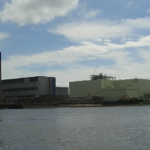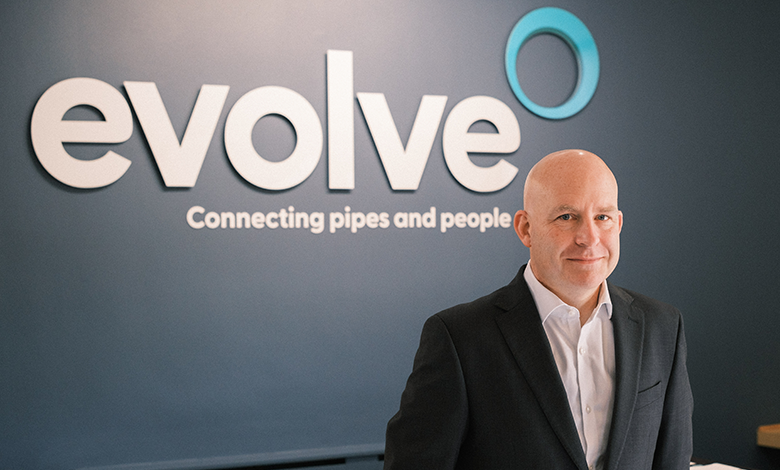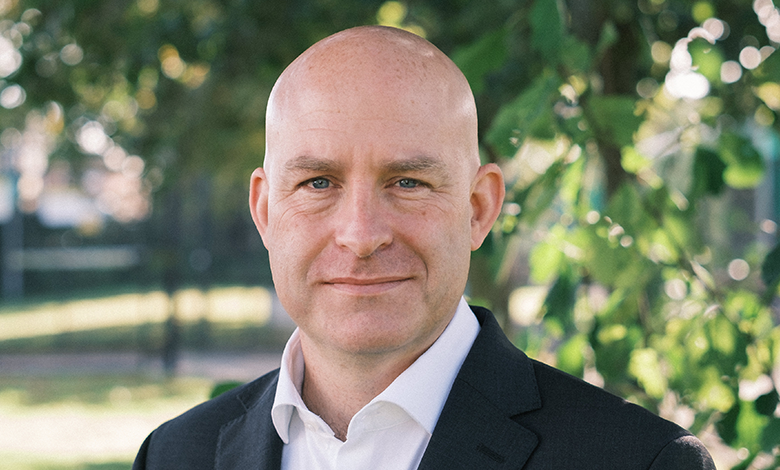
Back to the future: The opportunities of a net zero Northern Ireland
20th November 2023
Economic risks ‘especially pronounced’ for certain areas amidst energy transition efforts
20th November 2023Delivering a decarbonised gas network

Following the first direct to grid injection of biomethane into a gas network anywhere on the island of Ireland, Director of Evolve, David Butler, talks to David Whelan about the expansion of the west’s gas grid and the pathway to decarbonisation.
Describing the rebrand of SGN Natural Gas to Evolve as “the next logical” step, Director David Butler explains that the new name is designed to better encapsulate the organisation’s steady progress from an expanding gas distribution company, to one with ambitions for a fully renewable network before the end of the decade.
Evolve, the newest of Northern Ireland’s three gas distribution companies, recently delivered the injection of biomethane, a 100 per cent renewable energy fuel source, to the County Tyrone town of Dungannon, marking a significant milestone in the journey towards net zero for Northern Ireland’s gas infrastructure.
Butler believes that Evolve’s “tangible and demonstrable” injection and connection of biomethane to homes in the Dungannon area will not only serve as a springboard for the further expansion and decarbonisation of its own network in the west of Northern Ireland, but the beginning of a transformative journey for the whole gas industry.
Gas to the west
Butler served as SGN Natural Gas’ Head of Engineering when construction of the network commenced in November 2015. Live gas reached the gates of Strabane in February 2017, allowing LacPatrick Dairies Ltd to become the first connected commercial customer. The network expansion continued into the suburbs of Strabane, with the first domestic customer being connected in August 2017.
Growing a network in the remainder of the west presented significant challenges, including laying over 250km of mains pipeline and crossing over 50 rivers. All of these challenges were successfully overcome by mid-2019, enabling the company to bring gas to the doors of almost 27,000 customers in the towns of Coalisland, Cookstown, Derrylin, Dungannon, Enniskillen, Magherafelt, and Omagh.
Additional obstacles were presented in the form of the Covid-19 pandemic in 2020 and the escalation of the Russia-Ukraine war from 2022. However, such hurdles have not stopped the company from successfully connecting 4,000 customers to date, creating a clear pathway for a transformative target of 40,000 customers to be delivered by 2040, something that Butler describes as a source of pride.
“The Gas to the West project was created to address a recognised regional imbalance, which existed through the creation of the Phoenix Energy network in the east and then the more centrally located Firmus Energy licence area. Historically, the west of Northern Ireland, with its relative rurality and dispersed demographics, has been underinvested. As a result, fuel poverty, which is a challenge across the whole of Northern Ireland, is demonstrably worse in the west.
“Our focus is on offering people a safe and clean fuel to heat their homes, while reducing their carbon footprint.”
“The establishment and expansion of Evolve’s gas network, supported by the Northern Ireland Executive, is a major success story for households and businesses in the west. Gas not only provides an instantaneous means to reduce an individual’s carbon footprint by upwards of 40 per cent, but also moves away from the upfront costs associated with the use of oil or solid fuels,” he says.
“In addition to these environmental benefits, the development of our network provides businesses in the west with competitive opportunities in a global context, while also being able to create employment in areas where, typically, people were leaving every morning to travel to work elsewhere.
“Ultimately, the largest and most significant benefit of the network goes beyond the immediate gains. It paves the way for complete decarbonisation of heating in the long term, aligning perfectly with our vision of a fully renewable network. Our commitment to working sustainably, prioritising people’s wellbeing, fostering continuous innovation, and educating all stakeholders underpins our role as leaders in this transformative endeavour.”
Renewable
Butler readily acknowledges that while natural gas is significantly less carbon-intensive than burning oil, its status as a fossil fuel means that it cannot be a fuel of the future.
The strategy being led by Butler aligns with that of Northern Ireland Executive, with its Energy Strategy detailing the prominent role of gas in the pathway to net zero, thereby enabling consumers to spend less of the region’s carbon budget on an incremental basis, with little to no change to current infrastructure, and ultimately providing a pathway to net zero for decarbonised heat.
“Having tangible and demonstrable use of biomethane in the grid, with no disruption to the consumer, marks a historic moment in our collective journey.”
In October 2022, Northern Ireland’s five gas network operators launched a joint plan to fully decarbonise the region’s gas network by 2050, emphasising their belief that decarbonising the gas rather than changing the heating system will offer nearly 550,000 homes in Northern Ireland an affordable transition to net zero with minimal disruption.
Biomethane
Underpinning the report is research carried out by Queen’s University Belfast, which highlights that Northern Ireland’s large agriculture sector alone has the potential to provide feedstock for biomethane production to meet over 80 per cent of the region’s current gas distribution network demand.
Speaking about the significance of the first injection of biomethane into the Evolve network, in collaboration with Granville Eco Park, Butler says: “This ground-breaking milestone underscores the pivotal role of the gas network in decarbonising Northern Ireland. While we, and others, have continuously highlighted the pathway that exists to decarbonisation, having tangible and demonstrable use of biomethane in the grid, with no disruption to the consumer, marks a historic moment in our collective journey.”
Currently, around 1,000m3 per hour of biomethane enters the siloed gas network in Dungannon, 24 hours-a-day, seven days-a-week. Importantly, the renewable network is backed up by gas from the transmission pipeline should it be required, providing security of supply.
Discussing the ability to scale up biomethane injection, the Director says, “The Queen’s University Belfast research points to the potential of more than 6 TWh of biomethane available from the specific feedstocks of slurry and spare silage. Demand on the total distribution system for Northern Ireland is around 8 TWh, so there is evidence that with enhanced generation, through biomethane from waste, for example, a fully renewable gas system is completely viable.”
The Director explains that Northern Ireland’s gas distribution companies will soon, as a collective, launch a request for information and stakeholder engagement with developers, a process he anticipates could generate significant interest while also emphasising the huge potential of biomethane in the Republic of Ireland.
Support
While Butler is confident that the gas system is capable of being fully renewable, a key to success will be the increase of biomethane produced through anaerobic digestion. The Evolve Director believes that increased generation will require government support.
“To date, there is nowhere in Europe that has successfully launched a biomethane regime that has not had some form of support. We are conscious that supports are challenging in the current political and financial environment here in Northern Ireland, however, we are also adamant that we will not reach net zero if investments are not made,” he says.
Explaining what such support might look like, Butler says that a variety of options are available to policymakers but ultimately, any policy must incentivise the creation and injection into the grid, while making it easier for businesses to buy biomethane for heat.
“If we want to get to the point where we have large volumes of renewable gas coming onto the system, then some form of subsidy will be required to maximise that generation. Biomethane not only has a huge future role in the heat and transport industries, but it can also be a catalyst for transforming agriculture emissions.”
Agriculture is Northern Ireland’s largest greenhouse gas-emitting sector, disproportionately more so than in Britain. Butler highlights that the production of biomethane and ultimately, injection of renewable gas on the grid, represents a viable route to market for agricultural waste. While still in its infancy, discussions have also been ongoing on how enhancing anaerobic digestion at plants across the region could underpin the creation of an indigenous industry.
“Currently, we import fertiliser, manufactured through fossil fuels, from other countries but the potential exists to create our own sustainable bio industry, not only reducing the carbon intensity of current farming processes but ensuring that money stays within our local economy and local communities.”
Education
Butler emphasises that economic advantages to creating indigenous energy are one of the key strands of Evolve’s work on stakeholder engagement. Beyond onshore wind, Northern Ireland imports most of its energy in the form of fossil fuels. Recent price spikes, as a result of Russia’s invasion of Ukraine, have served to emphasise the benefits of indigenous energy generation in relation to cost and security of supply, however, Butler believes more needs to be done.
“I believe that we as energy providers have a huge role in helping the consumer understand the lasting benefits transitioning to gas, and subsequently renewable gas, can have. We also have a role in addressing some of the challenges that exist around proven technologies and around future pathways.
“However, I also believe that the government has a role as an honest broker in promoting the technologies which are tangible and viable. To ensure a just transition for all, the path to net zero must be affordable and equitable for everyone in Northern Ireland. For example, while electrification will play a huge role in Northern Ireland’s decarbonisation journey, the electrification of heat in its entirety would require wholesale changes to current infrastructure, all at considerable cost to the consumer.
“It would also require a system whereby security of supply for periods of low generation would only be guaranteed through high levels of curtailment as the norm.
“Biomethane offers the most practical solution for decarbonising the distribution side of gas networks in the short-to-medium term. Hydrogen, although a long-term option, is still at the research and development stage, requiring completion of the ongoing groundwork to underpin its use. We are in the fortunate position whereby all three of Northern Ireland’s gas distribution networks are very modern and would be in a position to meet that transition, when it is approved.”
Future
Concluding on his overall vision for Evolve in the coming years, Butler says that while the company remains relatively new, the new brand will help reinforce its ambition for a renewable gas system for the west.
“Our focus is on offering people a safe and clean fuel to heat their homes, while reducing their carbon footprint,” he explains.
“We hope to exceed the Utility Regulator target for the number of connected dwellings and businesses set out in our GD23 Price Control to 2028, but also maximise the levels of biomethane injected into the grid and enable our larger customers to access a decarbonised network.
“Going back to why this project first began, our aim is to ensure that people and businesses in the west are not disadvantaged to their counterparts in Britain, the Republic of Ireland, or in Europe. We are now in a unique position where biomethane presents an opportunity for our customers to leap ahead in terms of a fully decarbonised journey.”
|
David Butler David Butler was appointed Director of Evolve (formerly SGN Natural Gas) in October 2020, having previously served as Head of Engineering for over five years. Prior to this, Butler worked for Phoenix Natural Gas as an asset manager for almost 20 years. Butler holds a BEng in chemical engineering and a MSc in engineering computing from Queen’s University Belfast. Born in County Tipperary and living in Dundrod, County Antrim, Butler is an active sportsman who enjoys running, mountain biking, and adventure racing. A member of Mallusk Harriers, he is also a camogie coach at Glenavy GAC, where both of his daughters play. |

